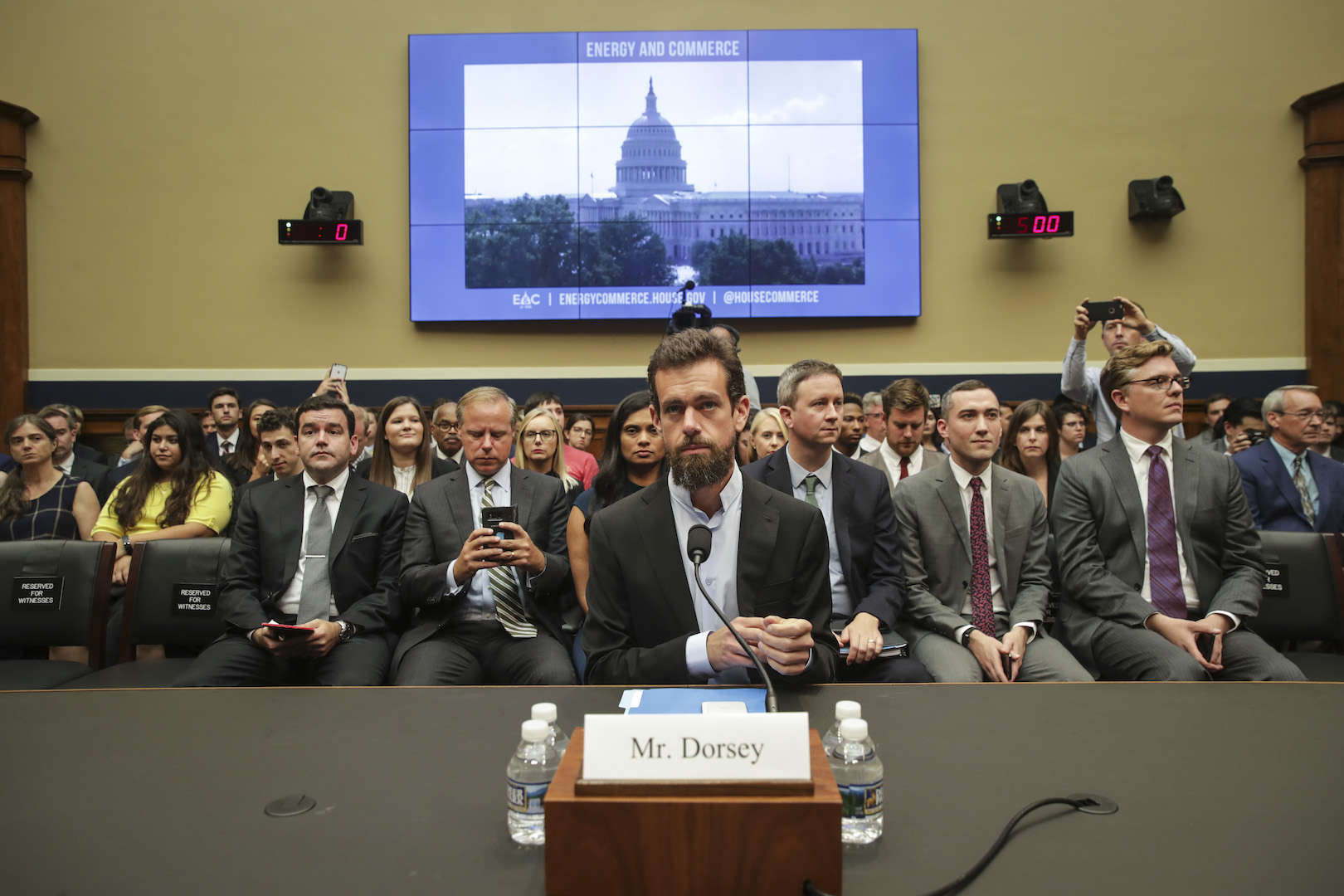- Twitter CEO Jack Dorsey says the company will no longer allow political ads on its social network.
- Dorsey explained the decision in a Twitter thread on Wednesday.
- “This isn’t about free expression. This is about paying for reach. And paying to increase the reach of political speech has significant ramifications that today’s democratic infrastructure may not be prepared to handle. It’s worth stepping back in order to address,” Dorsey tweeted.
- Twitter’s ban on political ads comes after Facebook announced that it would not fact-check paid political ads – a policy that has drawn scrutiny from lawmakers, the media, and the public.
- In fact, Dorsey’s Twitter thread came right as Facebook announced its quarterly earnings.
- Visit Business Insider’s homepage for more stories.
Twitter will no longer allow political advertisements, according to CEO Jack Dorsey.
Dorsey explained the decision in lengthy thread posted on Wednesday afternoon, and specifically pushed back against the reasoning Facebook CEO Mark Zuckerberg used to defend Facebook’s policy of allowing paid political ads that intentional lies and misinformation.
In fact, Dorsey’s Twitter thread came right as Facebook released its quarterly earnings.
“This isn’t about free expression. This is about paying for reach. And paying to increase the reach of political speech has significant ramifications that today’s democratic infrastructure may not be prepared to handle. It’s worth stepping back in order to address,” Dorsey tweeted.
A final note. This isn’t about free expression. This is about paying for reach. And paying to increase the reach of political speech has significant ramifications that today’s democratic infrastructure may not be prepared to handle. It’s worth stepping back in order to address.
— jack (@jack) October 30, 2019
Twitter's policy banning political ads will go into effect on November 22, and the full policy will be posted one week earlier, on November 15. Dorsey said online political ads present new challenges to the democratic process that will require "forward-looking" solutions, including new regulations and improved transparency.
"While internet advertising is incredibly powerful and very effective for commercial advertisers, that power brings significant risks to politics, where it can be used to influence votes to affect the lives of millions," Dorsey said.
"Internet political ads present entirely new challenges to civic discourse: machine learning-based optimization of messaging and micro-targeting, unchecked misleading information, and deep fakes. All at increasing velocity, sophistication, and overwhelming scale."
Twitter counters Facebook's stance on paid political ads
Dorsey also appeared to directly take on Facebook CEO Mark Zuckerberg's much-scrutinized public commitment to not fact-check political ads on the service.
For instance, it‘s not credible for us to say: “We’re working hard to stop people from gaming our systems to spread misleading info, buuut if someone pays us to target and force people to see their political ad…well...they can say whatever they want! 😉”
— jack (@jack) October 30, 2019
Earlier this month, Facebook CEO Mark Zuckerberg said he had considered removing political ads from Facebook entirely. The ads only make up a small portion of the social media platform's advertising revenue, but Zuckerberg said banning ads from politicians could create a slippery slope, in which ads dealing with specific issues like healthcare and immigration could be barred.
"Political ads are an important part of voice - especially for local candidates, up-and-coming challengers, and advocacy groups that may not get much media attention otherwise. Banning political ads favors incumbents and whoever the media covers," Zuckerberg said in a speech delivered at Georgetown University.
"Even if we wanted to ban political ads, it's not clear where we'd draw the line. There are many more ads about issues than there are directly about elections. Would we ban all ads about healthcare or immigration or women's empowerment? If we banned candidates' ads but not these, would that really make sense to give everyone else a voice in political debates except the candidates themselves?"
Zuckerberg's speech was focused on freedom of expression and the Facebook CEO said he didn't want his company to become the arbiters of truth on its social media platform. Zuckerberg said the public should be able to decide what information is true or false in political ads and discourse. As a result, Facebook has chosen not to fact-check political ads, though commercial ads are subject to third-party fact checkers.
In his thread announcing Twitter's complete ban on political ads, Dorsey's comments appeared to be in direct conversation with Zuckerberg's speech, including his claim that the decision was not about freedom of expression. Dorsey said Twitter considered just stopping ads from candidates, but realized that ads about specific political issues created the same problem. As a result, Twitter won't allow paid advertisements about political issues, either.
As for the issue that removing paid political advertising would benefit incumbents: Dorsey said that while Twitter acknowledges that argument, he believes that politicians can still connect with users via organic conversations, rather than paid reach.
In addition, we need more forward-looking political ad regulation (very difficult to do). Ad transparency requirements are progress, but not enough. The internet provides entirely new capabilities, and regulators need to think past the present day to ensure a level playing field.
— jack (@jack) October 30, 2019
Dorsey said Twitter wants to focus on "the root problems" that promote misinformation, threaten political discourse, and put elections at risk, - accepting money from groups with political agendas puts Twitter in a compromising situation that hurts the company's credibility, he said. And so, Twitter has chosen to put a stop to political advertising altogether, at least for now.
You can read Dorsey's full Twitter thread below:
"We've made the decision to stop all political advertising on Twitter globally. We believe political message reach should be earned, not bought. Why? A few reasons…
A political message earns reach when people decide to follow an account or retweet. Paying for reach removes that decision, forcing highly optimized and targeted political messages on people. We believe this decision should not be compromised by money.
While internet advertising is incredibly powerful and very effective for commercial advertisers, that power brings significant risks to politics, where it can be used to influence votes to affect the lives of millions.
Internet political ads present entirely new challenges to civic discourse: machine learning-based optimization of messaging and micro-targeting, unchecked misleading information, and deep fakes. All at increasing velocity, sophistication, and overwhelming scale.
These challenges will affect ALL internet communication, not just political ads. Best to focus our efforts on the root problems, without the additional burden and complexity taking money brings. Trying to fix both means fixing neither well, and harms our credibility.
For instance, it's not credible for us to say: 'We're working hard to stop people from gaming our systems to spread misleading info, buuut if someone pays us to target and force people to see their political ad…well...they can say whatever they want!'
We considered stopping only candidate ads, but issue ads present a way to circumvent. Additionally, it isn't fair for everyone but candidates to buy ads for issues they want to push. So we're stopping these too.
We're well aware we're a small part of a much larger political advertising ecosystem. Some might argue our actions today could favor incumbents. But we have witnessed many social movements reach massive scale without any political advertising. I trust this will only grow.
In addition, we need more forward-looking political ad regulation (very difficult to do). Ad transparency requirements are progress, but not enough. The internet provides entirely new capabilities, and regulators need to think past the present day to ensure a level playing field.
We'll share the final policy by 11/15, including a few exceptions (ads in support of voter registration will still be allowed, for instance). We'll start enforcing our new policy on 11/22 to provide current advertisers a notice period before this change goes into effect.
A final note. This isn't about free expression. This is about paying for reach. And paying to increase the reach of political speech has significant ramifications that today's democratic infrastructure may not be prepared to handle. It's worth stepping back in order to address."

